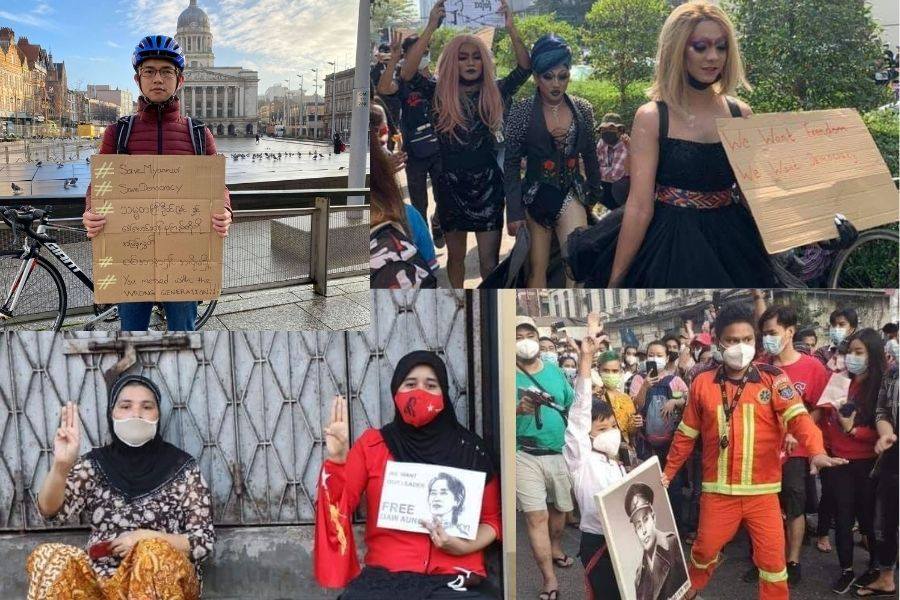“It was midnight in the UK when I first heard the news about the military taking over [power]…I was shocked and so scared that I stayed up for the whole night to follow up on the news,” said a student from Yangon who studies at the University of Nottingham.
The student wished to remain anonymous for security reasons, so we will refer him as Chow.
Myanmar announced a state of emergency for up to one year, according to the military-owned news channel Myawaddy News on Monday, February 1.
State media TV and radios and local phone lines were cut off by the authority and access to internet services was blocked.
Chow lost contact with his family and friends.
Following the coup, Aung San Suu Kyi, the elected civilian leader of Myanmar, was detained by the army and was charged for several accounts, including breaching import and export laws, and possession of unlawful communication devices.

Tens of thousands of people took to streets on Saturday, February 6, demanding the release of the democratically elected leader.
Clampdown on information has also been tightened with social media platforms.
Facebook, Twitter and Instagram were ordered to shut down by the Ministry of Transport and Communications to restrict posting and sharing.
He motivated that these posts are “inciteful news and disinformation” which could “damage the stability of the state and undermine the interest of the people”.
Communication between Chow and his family and friends was cut off for another 24 hours on the first day of the nationwide protest.
“My family told me not to worry about them and they are safe and sound.

“But being far away from home alone here in the UK, it’s really hard to understand what’s going on in the country and I constantly worry about my family and friends,” said the 19-year-old.
“Knowing what happened in the past really scares me,” he continued, referring to the bloody crackdowns during the 1988 uprising and protest in 2007.
“Back then, soldiers were ordered to shoot [protesters], a lot of people were injured and killed.”
So far, most of the latest demonstrations were peaceful.
But in the capital city Naypyidaw, it is reported that the junta fired water cannon at protesters on Monday’s protest, which led to several injuries as demonstrators knocked to the ground.
“Growing up in Myanmar, I do know that it is very possible for this kind of thing to happened, but I never thought it would come this soon,” added Chow.
“It is important to fight against this coup because a lot of people of different races and from different religions including Chinese, Indian, Shan, Mon, Karen, Chin, Rakhine and Rohingya, Buddhism, Muslim and Christian who live in Myanmar are going to suffer from the military.”

The coup is also a nightmare for Zeya Hein, an engineer from Yangon and now lives in Nottingham. He said he could not believe what is happening in Myanmar.
“It’s been ten years that we’ve had this partial democracy.
“I thought eventually we would go for the better not the other way around.”
“Most my family members are out on the streets to protest and support the general public, demand for democracy and condemn the military coup, including my nephews who are as young as 16 or 17 years old.”
When the online communication was cut off by the military during the weekend’s protest, Zeya said he was “put into the dark”.
“I tried to contact them through phone call.
“Some telecom services were not workable.
“Fortunately, my mum got several SIM cards with different companies and we tried out them all to see which one worked at that time.”
“I feel tired from the desire to constantly catch up with the news,” Zeya paused for a while and continued.

Zeya staged a solo demonstration at Old Market Square following the coup in Myanmar. “Born in 1984, I know how it was like to grow up in the fear of no freedom of speech or expression.
“I got my opportunity to study in the UK and have experienced this proper democracy.”
“We cannot let it [the history] happen again.
“I have brothers and sisters and their young children – there’s so much to live for.
“If the coup continues, their life would be very similar to mine.”
A petition launched in the name of Myanmar Citizens to the UN General Secretary Antonio Guterres requests the UN to facilitate negotiations between leaders of the military and those of the National League for Democracy.
“The military dictators have released a statement saying that protesters will be subject to the use of teargas, tasers, and even firearms.
“They have used violence in the 1988 uprising and will not hesitate to use lethal force again,” the statement reads.
“We urge your prompt action to prevent the unnecessary loss of lives during this civil unrest.”
The petition has so far gained nearly 700 signatures by the time of publication.
By Na Qing

